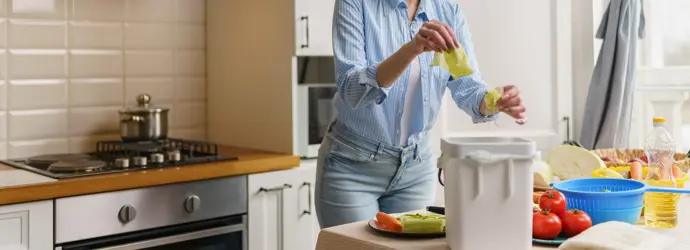2 people found this helpful

If you love turning waste into something useful, and you don’t mind getting up to your elbows in piles of stinky banana skins, crumbly tea bags and squelchy garden waste, you probably also love composting! But composting can sometimes be a slow process that requires patience. But can you accelerate compost and if so, what’s the fastest composting method?
To help you enjoy the fruits of your labour sooner, we have compiled 10 easy hacks to speed up your composting process. Discover our 10 best tips on how to speed up composting:
- Play with the carbon-to-nitrogen balance
- Cut and shred your materials
- Turn your compost regularly
- Adjust moisture levels regularly
- Use compost activators
- Use a compost tumbler
- Try hot composting
- Increase the size of your compost pile
- Adapt your composting in winter
- Be patient and persistent!
Tip
Not quite sure what you should and shouldn’t be composting? Don’t sweat it. Check out what you can and can’t put in the compost bin.
How to speed up compost: how long does compost take to decompose?
You’ve got all the basics of composting covered, your compost pile has all the materials it needs, and you’re now just waiting for it to decompose. But how long exactly does it take for compost to break down? The answer is it depends. Decomposition can take between a few weeks to two years, depending on the size of your pile, the materials you’ve used, and how often you’re mixing it.1,2 It can therefore be quite a long process, which explains why some of you might be looking for ways to speed up your compost!
It’s well-known: good things come to those who wait. And if you’ve ever fancied yourself an artist, only to give up five minutes later when there’s more paint tucked behind your ears and on your eyebrows than on the canvas, you’ll know: patience is a virtue.
Just like trying your hand at a new creative skill (the masterpiece is in the memory, anyway!), it’s worth being patient. You’ll know that your compost is mature and ready to use when it becomes dark brown, and has a soil-like texture. It should have an earthy smell, and you shouldn’t be able to recognise the materials you put in it, as they should have fully broken down.2 Have you been checking on your compost pile, but it seems to be taking a long time to decompose? Find out how to speed up compost next!
Here are our top tips on how to accelerate compost:
1. Play with the carbon to nitrogen balance
As you probably know, your compost pile is made of nitrogen-rich ‘green’ materials like vegetable scraps, fruit peels, and grass clippings, and carbon-rich ‘brown’ materials such as dry leaves, straw, and cardboard.3
While having 50% of green and 50% of brown produces good results and is usually recommended to maintain a good carbon-to-nitrogen ratio, some people choose to speed up their compost4 by adding more nitrogen-rich materials. This will break down your compost faster, though it might cause a smelly odour and affect the overall quality.5 In the end, the carbon-to-nitrogen balance that is right for you depends on the results you want to achieve with your compost!
Tip
Plenty Original, Flexisheets and Max kitchen roll sheets are now certified compostable!* Use them on compostable messes – like the glug of sticky orange juice that completely missed your mouth and slopped down on the table in front of you – and then toss them on your compost heap as ‘brown’ materials!
2. Cut, crush and shred your compost materials
Size matters in composting! Smaller pieces of organic material decompose much faster than larger ones. Therefore, take a moment to chop up your kitchen waste and garden trimmings before adding them to your compost pile. This simple step acts as a natural compost accelerator by increasing the surface area available to microbes, for them to decompose.6
3. Regular aeration through turning
Oxygen is a key player in the composting process. Turning your compost pile every few days introduces much-needed air into the mix, which helps speed up the decomposition process.2 This simple act can significantly accelerate compost, transforming waste into useful compost more quickly. This is a great activity for younger ones to get involved with. Give them a trowel and watch them go! But be prepared to fish slimy banana skins, crusty orange peel and shrivelled tea bags from nearby bushes, trees, and quite possibly their pockets...
Tip
Be sure to keep a roll of Flexisheet kitchen paper by the back door. Voted your Product of the Year for 2024,** you choose what you use with Flexisheets. From that new coat of autumnal leaves to the deluge of earthen sludge on your hands, you’ll always have the perfect amount of kitchen roll, no matter what you’ve managed to coat yourself in.
4. Adjust the moisture level regularly
Regularly adjusting the moisture level can significantly speed up composting, as it gives bacteria the most optimal conditions to break down the compost.7 Keep your compost at a “wrung sponge” consistency at all times to accelerate your compost, by adding water if it feels a little dryer than that, or on the contrary, by adding dry waste such as shredded paper, cardboard or compostable kitchen towels if it feels wetter.8
5. Introduce compost activators, avoid non-compostables
Adding compost activators like aged manure, coffee grounds, or even garden soil can introduce beneficial microorganisms to your compost pile.9 These activators are effective homemade compost accelerators that help break down the organic materials more quickly.
While there are organic items that can speed up your compost, there are also materials we should not compost. Not only do oils, fats, cooked meats and non-organic chemicals not break down into compost, they can actually slow down the composting process and introduce harmful chemicals into your soil. Check out our explainer for more information on what you should and shouldn’t compost, as well as when to compost your Plenty kitchen roll.
6. Consider using a compost tumbler
For those who find turning and mixing their compost manually challenging, a compost tumbler can be a fantastic alternative! A compost tumbler is a sealed container that rotates, and that simplifies the process of regularly mixing your compost, which is crucial for faster decomposition.10
7. Experiment with hot composting
Hot composting is one of the fastest composting methods. It consists in making the compost pile reach higher temperatures, and therefore, accelerates the decomposition process. While this method requires more materials, effort and monitoring than regular compost, it can be effective if you want to speed up your compost.11
8. Increase the size of your compost pile
Bigger is better, right? That’s what you tell yourself as you stare at the mountain of curry-streaked bowls and licked near-clean spoons by the sink... Why do online recipes require you to use every single pan in the kitchen? (The happy faces of your now-stuffed family make it all worth it, though.)
Similarly, a larger compost pile will break down faster than a smaller one. That’s because a larger pile of compost holds heats more efficiently than a smaller one. While you can obtain good results with a small pile, the process will be slower. So, if you’re looking for ways to accelerate your compost, try increasing the size of your compost pile! 7,12
9. How to speed up compost in winter: Adapt your composting in winter
Are you wondering how to speed up compost in winter? Because microbes and other microorganisms need warmth to break down the materials in the compost effectively, composting in winter can be challenging due to the lower temperatures.13 To speed up compost in winter, insulate your compost pile by covering it with a tarp or using a compost bin. This will help retain the heat and moisture necessary for decomposition, even in colder months.
10. Be patient, consistent, and persistent
Composting is a natural process that sometimes requires time and patience. But it’s also gratifying, and contributes to caring for the planet. Moreover, composting is a fun activity to do with friends or with your family, that is suitable for people from all ages – so get adults, elderly, and children involved to help you speed up your compost! Keep applying these composting tips, and you will soon see results.
These 10 hacks to speed up compost are easy to implement and can make a difference in your composting journey. Remember, each choice to compost is a step towards a sustainable lifestyle. Next time you’re wondering how to accelerate compost naturally, you can refer back to these tips and methods. By composting efficiently, you not only enrich your garden, but also help care for the planet. Let's all do our part, one compost heap at a time!
*Plenty kitchen towels are certified as home and industrially compostable according to NF T 50-800 and EN14995.
**Winner General Household Category. Survey of 8,000 people in UK & ROI
Sources:
3 Gardening Know How, “Understanding the browns and greens mix for compost”
4 LowImpact.org, “Composting: explaining the carbon-nitrogen ratio”
5 Planet Natural Research Centre, “Carbon-to-Nitrogen ratio”
6 Planet Natural Research Centre, “Physics of composting”
8 Planet Natural Research Centre, “Managing moisture in compost”
10 WebMD, “What to know about compost tumblers”
11 The Spruce, “Hot composting: how to make compost in less time”
12 Planet Natural Research Centre, “Physics”
13 GreenSleeves, “How to compost in winter: tips and tricks”
Related articles
2 easy ways to make homemade musical instruments for kids
Looking for easy ways to have fun with your kids while teaching them how to recycle? Learn how to make musical instruments from waste material.

Why is my cat being sick? Symptoms, causes, and solutions
“Why is my cat sick?” Learn about the signs of illness in cats, the reasons why your feline friend might be sick, and how to treat a sick cat at home.

How to save money at home: simple saving tips and budgeting tips
Looking for simple ways to save money at home? Follow our budgeting tips and saving ideas to help you save money and provide more for your loved ones!

What to do with leftover food: creative ways to use food leftovers
From leftover chicken ideas, to what to do with leftover rice, find out how to get the most from your food leftovers.

Shortage of water: what is water stress and what can we do about it?
What is water stress, and what can we do to reduce its impact? Learn about water stress, its definition, causes, effects, and how to help water scarcity.

How to save money on food shopping with eco-friendly shopping tips
Want to know how to save money on groceries and how to shop sustainably at the same time? Look no further than our top tips.


